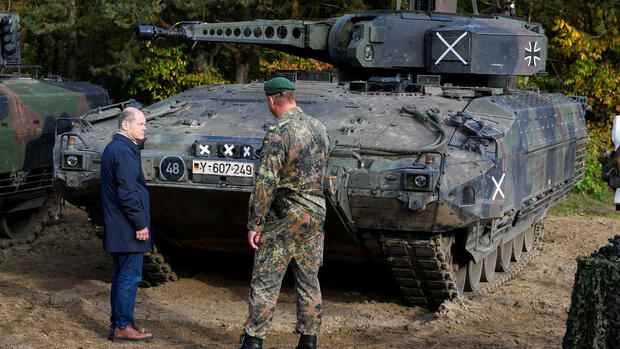The number of pieces for the intended second lot of the Puma is reduced almost every week.
(Photo: Reuters)
Berlin The federal government is massively cutting the planned equipment offensive for the Bundeswehr. Many projects, especially for the naval and air forces, would have to be called off, the Handelsblatt learned from circles in industry and politics.
The background to this is the rapid rise in inflation, which is making planned purchases more expensive. In addition, the Federal Court of Auditors complained that the projects listed in the business plan for the special fund exceeded the budget of 100 billion euros.
“With many projects running for five to seven years, inflation in the dimension creates a serious financial problem,” said a person familiar with the proceedings. Among other things, a third tranche of the K130 corvette, new Eurofighters for electronic warfare, new frigates and new self-propelled howitzers, which should be ordered to replace the systems delivered to Ukraine, are at stake. There are talks between politicians and industry about these projects.
Read more about the special fund for the Bundeswehr here
Top jobs of the day
Find the best jobs now and
be notified by email.
The purchase of the F-35 fighter jet and the heavy transport helicopter Chinook are considered set. There is no turning back with the F-35, as the machine is indispensable for Germany’s nuclear participation, it said. In addition, talks with the US government about the purchase of the aircraft from the manufacturer Lockheed Martin have progressed.
However, the planned number of 35 machines for the F-35 is apparently up for grabs. One reason is that the federal government calculated the purchase with a dollar exchange rate of 1.1 to the euro, said a member of the governing coalition. The strong dollar makes imports from the USA more expensive.
The quantity of the second batch of the Puma infantry fighting vehicle, for which 304 million euros were estimated this year, is also being reduced every week, the coalition politician said. In addition to the inflation-related increase in purchase prices, there are growing interest expenses for the loan-financed special fund. The calculation here is seven instead of three billion euros.
Representatives from the armaments industry complained that the budget of 100 billion euros was high but not enough. “To fulfill the wishes of the Bundeswehr, 200 billion euros are needed,” said a manager from the defense industry. In its report on the draft of the economic plan, the Federal Court of Auditors also criticized the fact that the planned total expenditure exceeded the financial framework of 100 billion euros.
>> Read here: “100 billion euros will not be enough” – Airbus armaments chief promotes European air defense system
This is “inadmissible” because there is a risk that the Federal Ministry of Defense will later not be able to fully service the obligations it has entered into from the special fund. “Additional burdens for the federal budget would be the result,” says the report, which is available to the Handelsblatt.
The guardians of a solid budget policy also criticize the fact that planned expenditure, for example for the F-35 fighter jet or the heavy transport helicopter, is not estimated individually in the economic plan, but is combined with other projects in the collective title “Dimension Air”. There is a risk that funds will be used for other projects and that the financing of the F-35 or the helicopter will not be secured in the end.
In its statement to the Court of Auditors, the Federal Ministry of Defense writes that it is still revising the draft of the economic plan together with the Federal Ministry of Finance with a view to the final budget deliberations. There is no talk of cancellations of individual projects.
More: Thyssen-Krupp Marine Systems wants to restart with stealth submarines
